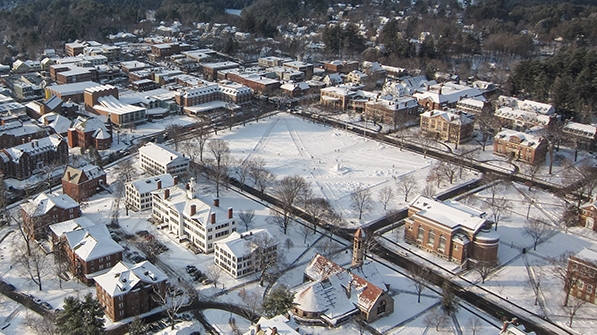Dartmouth is implementing a program to protect the value of properties located in the Rennie Farm neighborhood that have been affected or potentially affected by the groundwater from the farm.
The Rennie Farm Value Assurance Program (VAP) will offer payment to property owners and possibly purchase some properties, depending on a number of conditions, including whether the chemical 1,4-dioxane from Rennie Farm has been found on the property; whether the College has accessed the land to install monitoring wells or treatment systems to investigate or remediate; whether the property is for sale; and the location of the land. Dartmouth has retained a law firm to manage the program externally.
“The Value Assurance Program is designed to protect your property value whether you want to sell your property or want to remain in your home,” says Executive Vice President Rick Mills. “This program assures that eligible property owners who choose to sell receive market value for their property. Our goals are to reduce market uncertainty, maintain property values, decrease selling time, and provide liquidity.”
Eligible properties have been identified from the area in and around the Rennie Farm site investigation. Participation in the program is voluntary (sign-up or enrollment is not required) and will remain open to eligible property owners from Feb. 3, 2017, to Feb. 3, 2022.
The program will offer:
- Experienced and knowledgeable local real estate agents to professionally market eligible homes;
- Experienced and knowledgeable local real estate appraisers to determine the market value of eligible property absent the influence, if any, of the environmental conditions related to Rennie Farm;
- Reimbursement of real estate agent commissions paid at the time of closing if eligible property sells for 95 percent or more of market value, and,
- A property purchase option for participants who are unable to sell their property after listing and following the VAP program requirements for 180 days.
The VAP will be facilitated by Tom Csatari of the law firm Downs Rachlin Martin in Lebanon, N.H.
From the mid-1960s to 1978, Dartmouth used a half-acre plot on the College-owned Rennie Farm, located in the Hanover village of Etna, to dispose of animal remains used in medical research, under state and federal licenses.
To date, more than 120 private water supply wells surrounding the Rennie Farm have been sampled, and 1,4-dioxane from Rennie Farm has been detected in only one private water well. Information about the work the College is performing to investigate and remediate the site can be found on the Rennie Farm Project website.
First detected in the area in 2012, 1,4-dioxane is a synthetic substance used primarily as an additive in solvents and is “reasonably anticipated to be a human carcinogen” by the U.S. Department of Health and Human Services, according to the federal Centers for Disease Control. It is also found in numerous personal care and cleaning products.
Dartmouth is conducting the investigation and remediation of 1,4-dioxane in compliance with state regulatory requirements and in cooperation with the New Hampshire Department of Environmental Services and the New Hampshire Radiological Health Section.
For more information about the program, visit the VAP website, call (603) 442-4527 or email Csatari at facilitator@drm.com.
